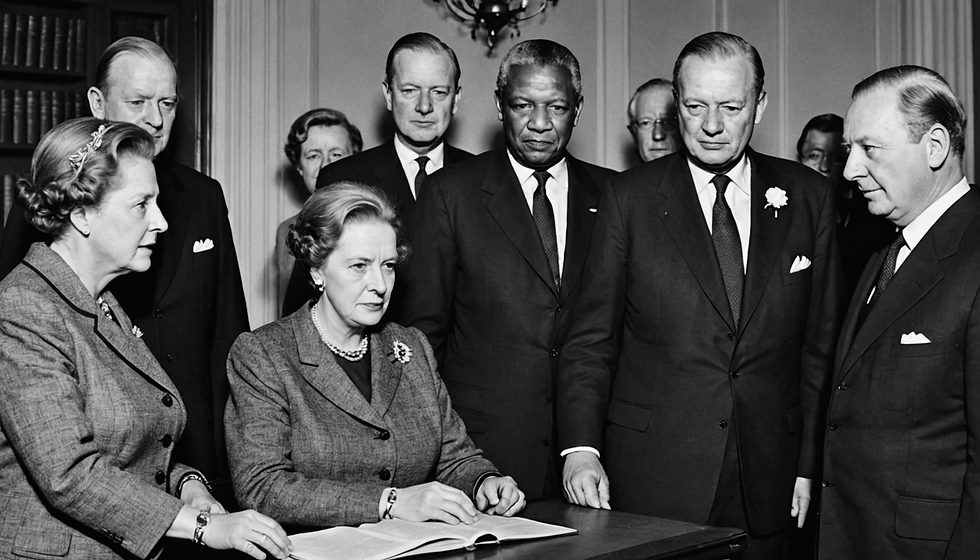The elegance of "éminence grise" in leadership: Crafting change through covert yet ethical diplomacy "Père Joseph" (1577-1638)
- R.M. Boylan

- Jun 26
- 8 min read

The Art of "éminence grise" in Leadership & Change
Informal leadership is more than just a trend; it is a dynamic force that shapes our communities, our nations, negotiating peace parleys and social progress. This subtle form of influence is often overlooked in traditional power structures, yet it holds incredible potential for instigating real change. Picture the idea of someone working behind the scenes, guiding decisions and inspiring others without any formal title. This blog post explores the historical roots of informal leadership, its elegance in diplomacy, and how it aligns with the psychology of influence, as explained by Robert Cialdini.
The Origins of "éminence grise"
The term "éminence grise" dates back to the 17th century. It refers to Cardinal Richelieu’s influential private secretary, Père Joseph (1577-1638). Donning a grey cloak, Père Joseph shaped major decisions without holding an official title or any positional authority. This historical figure serves as a prime example of how informal leaders can create impactful change in society.
Historically, Père Joseph was not just advising; he played a critical role in state affairs, influencing wars and policies. For instance, during the Thirty Years' War, his strategies significantly shifted European power dynamics without commanding troops or drafting policies outright. This metaphor for discreet leadership reminds us that true power often lies beyond formal titles and visible authority.
An éminence grise, or gray eminence, refers to an influential decision-maker or advisor who works behind the scenes in a private or unofficial role.
When reviewing the history you may get stumped by the names used to describe this subtle and elegant covert operator trying to influence change. The original word éminence grise, means a powerful advisor who operates secretly, was François Leclerc du Tremblay, also known as Père Joseph. He was the trusted confidant and agent of Cardinal Richelieu, who was often referred to as l'Éminence Rouge. The term "éminence grise" became associated with Leclerc due to his behind-the-scenes influence and his grey Capuchin habit, in contrast to Richelieu's red cardinal's robes.
The original French phrase referred to Francois Leclerc du Tremblay, who was Cardinal Richelieu's right-hand man and the de facto ruler of France. Leclerc was a member of the Order of Friars Minor Capuchin and wore the gray robe of that Franciscan order, which led to the use of the nickname "Grayfriars" for many Franciscan friaries throughout Medieval Europe.
Informal Leadership: A Poised & Soft Sell Approach to Influence
Informal leadership shines in its ability to cultivate influence through relationships and trust. Unlike leaders who rely solely on traditional authority, informal leaders guide their followers quietly and effectively. This elegant method aligns perfectly with Cialdini's principles of persuasion, especially in fostering social proof, authority, and reciprocity.
For example, when an informal leader spends time helping colleagues with their tasks, they build goodwill. This personal investment leads to a more collaborative environment where people feel inclined to reciprocate support. Research shows that 70% of employees report being more engaged when they trust their leaders and feel a sense of community compared to leaders who inflict fear & pain through creating a threatening environment which constricts human productivity freezing it.
The Psychology of Influence & Cialdini's Principles
Cialdini outlines essential principles that govern human behavior, illustrating how they relate to informal leadership:
Reciprocity: When someone gives freely, others feel compelled to offer something in return. Imagine a team leader who shares credit in meetings; this encourages everyone to support team initiatives.
Commitment and Consistency: Individuals who make small commitments often stick to their larger promises. An informal leader may begin by encouraging team members to set small, achievable goals, which in turn leads to greater accomplishments.
Social Proof: People want to align with prevailing behaviors. Informal leaders can create a positive culture by showcasing individuals who practice integrity and ethical behavior.
Authority: Although lacking formal titles, informal leaders build credibility through expertise and past successes, making their influence significant.
Liking: People are more likely to listen to those they like. Informal leaders foster connections, making persuasion feel authentic and nurturing.
By harnessing these principles, informal leadership becomes an ethical method for effecting change, especially in addressing corruption.
Addressing Immorality & Corruption with Elegance
Tackling immorality or corruption is a challenge. Often, direct confrontation can backfire. However, informal leaders create a safe space for dialogue and reflection. For example, consider a workplace initiative focused on ethical practices. Instead of top-down mandates, informal leaders can lead discussions that promote shared values and encourage others to reflect on their decisions.
This slow, deliberate strategy fosters cultural integrity. For instance, one study revealed that organizations with a strong ethical culture saw a 30% decrease in misconduct compared to those with poorly defined values. This emphasizes that genuine change comes from within rather than imposed regulations.
The Ethics of Covert Influence
While the term "covert influence" may raise concerns, it’s critical to distinguish between unethical manipulation and ethical persuasion. Informal leaders base their actions on community needs, aiming to enhance ethical behavior across their organizations.
Consider a community leader advocating for better environmental practices. They may use informal channels to encourage local businesses to adopt sustainable practices, leading to a shared commitment to eco-consciousness. This cooperative strategy builds trust and community solidarity while promoting collective goals.
The Art of Diplomacy in Informal Leadership
Effective diplomacy involves understanding human motivations. Informal leaders navigate complex social landscapes, influencing behaviors without authoritarian pressure. This collaborative strategy leads to deeper connections that foster commitment and shared visions for the future.
For example, research shows that teams led by informal leaders who focus on collaboration report higher satisfaction levels—up to 50% more than teams led by authoritative figures. This demonstrates that patience and connection can yield profound results over time as followers become self-motivated to drive change.
Effective Leadership Beyond Authority
In summary, effective leadership reaches beyond formal authority. Many outstanding changes result from those who encourage others to take initiative. The concept of eminence grise represents this advanced leadership style, focusing on inspiring a commitment to ethical principles within a community.
This approach leverages relationships and emotional intelligence to cultivate genuine change. Informal leaders excel in connecting with others, sparking inspiration, and driving meaningful transformations.
Embracing the Power of Informal Leadership
The elegance of informal leadership lies in its ability to incite change through psychological influence and strategic diplomacy. By understanding the historical context of eminence grise and applying Cialdini’s principles of persuasion, we see this approach is effective, ethical, and sustainable.
As we face challenges involving immorality and corruption, informal leadership may hold the key to developing a workplace culture rooted in integrity and commitment. Focused, thoughtful, and deeply rooted in relationships, informal influence represents both a practical tool for change and a hallmark of what true leadership looks like. In the end, lasting leadership is defined not by authority but by the ability to inspire others to pursue a more ethical and meaningful future.
Results of Pere Joseph's Eminence Grise Approach
Informal leadership is becoming increasingly important as organizations strive for more effective and compassionate leadership styles. The term éminence grise, meaning "gray eminence," perfectly captures a person who wields influence without a formal title. Informal leaders, like eminent grises, often achieve better results than traditional leaders and the significant contributions of Pere Joseph in 17th-century France are indicative of this fact.
Understanding Informal Leadership and Eminence Grise
Informal leadership is a departure from traditional hierarchical structures, which prioritize power and authority. Instead, it focuses on building relationships, trust, and a sense of community. Eminence grise is a strong representation of this idea, illustrating how some individuals lead through their wisdom and guidance, often from behind the scenes.
These leaders typically exhibit a thorough understanding of their surroundings and possess high levels of emotional intelligence (EQ-i). They gain influence from the respect and trust of their peers rather than from a formal position. This leads to a 70% higher engagement level in human systems and loyalty.
Pere Joseph: The Eminence Grise of France
Pere Joseph, a vital player in France during the 1600s, exemplified the effects of informal leadership. He served as a spiritual advisor and confidant to Cardinal Richelieu, acting as both a cleric and a shrewd political thinker of his time.
His informal approach allowed him to unite various groups, fostering collaboration towards shared objectives. By promoting tolerance, he reshaped perceptions of authority and governance. Instead of fear, he showed that compassion and wisdom could create positive change.
One of his most notable achievements was his pivotal role in centralizing the French state. He worked to reconcile the monarchy with Protestant factions, helping to pacify a nation stricken by religious conflict.
The Concrete Positive Changes Brought About by Pere Joseph "éminence grise" of France
Pere Joseph’s informal leadership style initiated several significant changes in France:
Promotion of Tolerance: Joseph's advocacy for dialogue and empathy fostered reduced religious conflict. He demonstrated that understanding can lead to peace and stability, particularly valuable in a society characterized by religious tensions.
Strengthening of the Monarchy: By mediating between groups, he contributed to the establishment of a more robust centralized government. This unity allowed for smoother governance, resulting in reduced internal strife and greater national coherence.
Enhanced Diplomacy: He championed diplomacy over aggression, which strengthened his informal networks and facilitated beneficial exchanges among various stakeholders, enhancing the overall well-being of society.
Influence on Enlightenment Thinking: Joseph’s ideas laid a foundation for later Enlightenment thinkers, emphasizing rational governance and ethical leadership. His approach inspired future generations to consider more democratic and humane forms of leadership.
Catalyst for Education Reform: Through his efforts to promote education, he helped establish a framework for social reforms that shaped the future of France's intellectual landscape.
These contributions illustrate how informal leadership built on trust and mutual understanding can lead to substantial positive shifts in society.
The Role of Trust in Informal Leadership
Trust is vital in informal leadership. Studies show that the environment created by a leader significantly impacts employee & human engagement. Leaders who foster a climate of fear hinder productivity, while those who cultivate trust experience enhanced innovation and collaboration. In fact, organizations with high trust levels report 50% higher performance.
Trusted leaders empower their teams to voice ideas and challenge norms. They create a culture where everyone feels valued, contributing to problem-solving and innovation. Pere Joseph provides a historical example of how informal leadership can guide decisions that prioritize community well-being over individual ambition.
Final Thoughts on Informal Leadership
The significance of informal leadership, as demonstrated by the concept of éminence grise, is more relevant today than ever. Leaders who cultivate trust and community can inspire cooperation and innovation within their teams.
Pere Joseph's legacy serves as a powerful reminder of the effectiveness of informal leadership styles. His contributions toward societal harmony in France exemplify that true leadership is often exercised behind the scenes, where character and wisdom can engender meaningful change.
As modern organizations evolve, adopting informal leadership principles can lead to increased productivity and engagement. Shifting from fear-based to trust-based leadership is essential for thriving in today's complex environment.
Ultimately, the lessons from Pere Joseph & teaching éminence grise beyond history; they highlight the essential human need for connection and trust in leadership. Embracing informal leadership could be the key to unlocking the potential of today's organizations.
References
Gallup. (2021). State of the Global Workplace: 2021 Report.
Coghlin, T. M. (2020). Understanding Informal Leadership: The Role of Community in Modern Organizations. Leadership Quarterly, 31(4), 818-835.
De Roubaix, M. (2019). Pere Joseph and the Politics of Tolerance in Seventeenth-Century France. French Historical Studies, 42(1), 35-56.





Comments